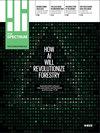An Undo Button for Nuclear Armageddon
IF 2.4
4区 工程技术
Q2 ENGINEERING, ELECTRICAL & ELECTRONIC
引用次数: 0
Abstract
IN 1956 HENRY KISSINGER speculated in Foreign Affairs about how the nuclear stalemate between the United States and the Soviet Union could force national security officials into a terrible dilemma. His thesis was that the United States risked sending a signal to potential aggressors that, faced with conflict, defense officials would have only two choices: settle for peace at any price, or retaliate with thermonuclear ruin. Not only had “victory in an all-out war become technically impossible,” Kissinger wrote, but in addition, it could “no longer be imposed at acceptable cost.”核世界末日的撤销按钮
1956年,亨利·基辛格在《外交事务》杂志上推测,美苏之间的核僵局将如何迫使国家安全官员陷入可怕的两难境地。他的论点是,美国冒着向潜在的侵略者发出信号的风险,即面对冲突,国防官员只有两个选择:要么不惜一切代价达成和平,要么用热核毁灭进行报复。基辛格写道,不仅“在全面战争中取得胜利在技术上是不可能的”,而且“再也无法以可接受的成本强加于人”。
本文章由计算机程序翻译,如有差异,请以英文原文为准。
求助全文
约1分钟内获得全文
求助全文
来源期刊

IEEE Spectrum
工程技术-工程:电子与电气
CiteScore
2.50
自引率
0.00%
发文量
254
审稿时长
4-8 weeks
期刊介绍:
IEEE Spectrum Magazine, the flagship publication of the IEEE, explores the development, applications and implications of new technologies. It anticipates trends in engineering, science, and technology, and provides a forum for understanding, discussion and leadership in these areas.
IEEE Spectrum is the world''s leading engineering and scientific magazine. Read by over 300,000 engineers worldwide, Spectrum provides international coverage of all technical issues and advances in computers, communications, and electronics. Written in clear, concise language for the non-specialist, Spectrum''s high editorial standards and worldwide resources ensure technical accuracy and state-of-the-art relevance.
 求助内容:
求助内容: 应助结果提醒方式:
应助结果提醒方式:


